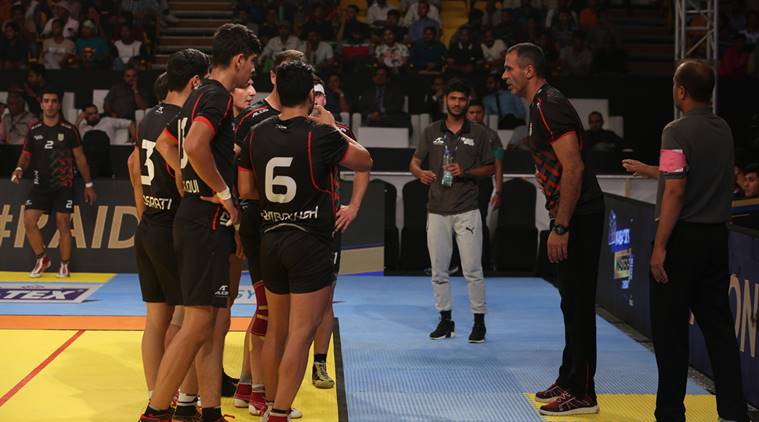 Iran kabaddi team has grown leaps and bounds.
Iran kabaddi team has grown leaps and bounds.
Tall, muscular, broad-shouldered, there isn’t much physical difference between the Iran kabaddi team and their opponents. Yet they stand out with their easy confidence. Their walk, at the team hotel or inside the Al Wasl Indoor Stadium, is casual, measured, slow and graceful. And when they strut about their business, dressed in identical grey T-shirts, their silent way remains wholly conspicuous.
On court though, at the Kabaddi Masters Dubai, the nonchalance is replaced by a beastly drive. The tackles are crushing, and the raiders don’t bother attempting the dips, jumps or feints that the Indians have perfected. Instead, the Iranian attackers prefer to simply barge through – and they do it quite well.
The traits push the boundaries of all that is considered ‘textbook’ in a sport India has dominated. And it’s through that very style – so uniquely Iranian – that has made the Middle Eastern country the only one to have gotten near – just two points short – from toppling India’s 28-year hold of the Asian Games gold.
That final at Incheon in 2014 is a match that then India captain Rakesh Kumar claimed was one ‘India should not have won.’ Especially since Iran had only a few players of the same calibre as the eventual champions.
“What we lost out on was experience,” says Iran coach Gholamreza Mazandarani. “We had a few players who were of the same quality and strength of India. But we didn’t have much match experience. Rakesh Kumar for example, had played more international matches than all our players combined.”
What Iran did earn though, along with a second successive silver medal, was the confidence of being able to challenge the Indians. Again in the final of the 2016 World Cup in Ahmedabad, Iran led the hosts for a majority of the match before losing towards the end.
The confidence grew, but was not kept in check.
In Gorgan, the home of kabaddi in Iran, the hosts were to play a new-look Pakistan team in the semi-final of the Asian Championships last year. They took the game too lightly, allegedly not even warming up properly, only to be handed an upset defeat.
“That match had many fans watching in the stadium,” says Mazandarani, who was an assistant coach at the time. “It was a big shock. But we started again.”
At the restart though, a few changes were in order. Mazandarani, who had stepped down as head coach after the 2014 Asian Games was brought back to take charge of the team. But for the first international outing since the shock in November, the 42-year-old has named a second-string team – with nine new players – for the tournament in Dubai.
The likes of star defender Fazel Atrachali – who became the first crorepati at the recent Pro Kabaddi League auctions – and skipper Meraj Sheykh were left out of the squad that has come to Dubai. But the dropped seniors still had a purpose to serve.
“A week before this tournament, we had two matches with the Iran ‘B’ team that had Meraj and Fazel in it,” says Mazandarani. “We wanted to give the first team here some good competition. But these new players won both the matches, by eight and 10 points.”
Since Iran formed its federation in the early 2000’s, the coaches have scouted for players with wrestling and martial arts backgrounds. The current team is no different as most players grapple part-time during the off-season. The depth of the Iran squad however has increased since the federation started a new youth development program after Incheon.
“A few of our younger players have come from straight kabaddi backgrounds,” says Mazandarani, who was also a former wrestler before switching sports and winning silver at the 2003 World Cup. “Apart from the 14 here, there are 20 more players in the national camp. So anyone can make it to the Asian Games team.”
That is the ultimate goal.
Since kabaddi was introduced to the Asian Games in 1990, India has won each of the seven editions. Only Iran has come close to toppling the giants. Now they’re preparing for another big bout.